Archive by Author
The Alarming Violence against Northeasterners and Women in India
Posted on April 27, 2011, by mercedes, under Gender Masala.
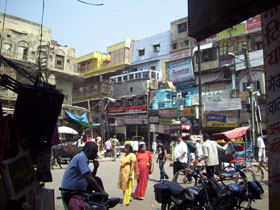
Streets are not safe for women, especially in poorer neighborhoods.
By Karen Ma
When I first arrived in Delhi two years ago, I noticed a rather disturbing tendency among most waiting drivers, street salesmen, or household guards. They would leer at my Asian women friends and me when we strolled past them on quiet residential streets. Male shopkeepers and auto-rickshaw drivers would smile insinuatingly or make snide remarks when I visited local markets. I had trouble understanding the source of this unwanted attention, especially given that I’m a middle-aged mom with a teenage son and also dress conservatively. Okay, I’m a Chinese-American, have slanted eyes and look visually different from the locals. But is this enough reason to draw such reactions? (more…)
141 Comments
Pakistani women and maternal health-photographs by a western female journalist
Posted on December 7, 2010, by mercedes, under Gender Masala.
By Zofeen Ebrahim
Journalist based in Karachi. Pakistan
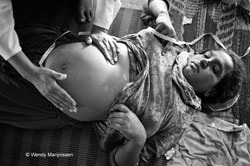
Hamida is a pregnant woman I met over 1.5 months ago in one of the many flood camps in Pakistan. In the final stages of her pregnancy I had the honor to spend lots of time with her and her family and document their life in the camp. Last week she gave birth to a baby boy Rehan Ali and the family is hoping to return to their village very soon to rebuild their lives. More images and in depth coverage on this incredible family can be seen on my website: http://wmarijnissen.photoshelter.com/ gallery/Hamida-work-in-progress/G0000y0lH46v4ZqY/
I met Wendy Marijnissen, 36, a photojournalist from Belgium and was quite intrigued by her story. An aspiring woman looking to capture the truth as it is, she came to Pakistan in Nov. 2009, throwing all caution to the wind that included turning her back on the travel advisory that warned western travelers. She believed in visiting with “an open mind” as the best entrance to a new country. Her mission—to capture through her lens the lives of Pakistani women. “I wanted to portray the Pakistani women, to give to the western audience a different view, which is less clichéd than what people might expect,” she told me. (more…)
45 Comments
Infertility no longer a “choice” for women
Posted on November 22, 2010, by mercedes, under Gender Masala.
By Satoko Nagaoki, associate professor.
Reproduction rights, Gender and Women`s Studies
 The Feminist International Network of Resistance to Reproductive and Genetic Engineering Resistance(Finrrage), was started in 1985 by a small group of women from all over the world. They made pregnancy a choice for women and I was invited as one of the participants. In 1991, I became one of the founding members of the Japanese organization。Our concept was to build a infertile women’s self-help group, name of “The friends of Finrrage”. (more…)
The Feminist International Network of Resistance to Reproductive and Genetic Engineering Resistance(Finrrage), was started in 1985 by a small group of women from all over the world. They made pregnancy a choice for women and I was invited as one of the participants. In 1991, I became one of the founding members of the Japanese organization。Our concept was to build a infertile women’s self-help group, name of “The friends of Finrrage”. (more…)
115 Comments
Lobbying for Dual Custody
Posted on September 21, 2010, by mercedes, under Gender Masala.
By Masako Suzuki
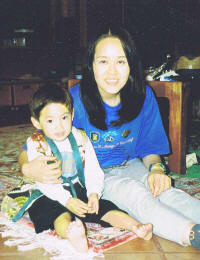 We married in April 1986 and lived in Japan for five years. I worked, holding workshops and exhibitions of my fabric dye products and running clothing import business. In fact, I earned about three times what my husband did at first even though his income grew bigger later. In 1991 we decided to try to setup a business in Canada and eventually emigrate and so I quit my own job so to go with him and help him be successful. We moved to Canada in October 1992 and bought a house. (more…)
We married in April 1986 and lived in Japan for five years. I worked, holding workshops and exhibitions of my fabric dye products and running clothing import business. In fact, I earned about three times what my husband did at first even though his income grew bigger later. In 1991 we decided to try to setup a business in Canada and eventually emigrate and so I quit my own job so to go with him and help him be successful. We moved to Canada in October 1992 and bought a house. (more…)
112 Comments
Burning Maputo
Posted on September 8, 2010, by mercedes, under Gender Masala.
a testimony by Mercedes Sayagues*
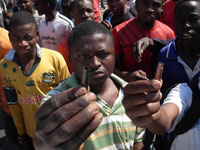
I was 50 meters away when the bullet hit Helio Ruite, slicing a chunk of his skull. Helio was 12 years old and heading home when he was caught between rioters and police on Acordos de Lusaka avenue in Maputo. He died on the spot, one among a dozen killed today. (more…)
155 Comments
Women and War
Posted on July 13, 2010, by mercedes, under Gender Masala.
Suvendrini Kakuchi
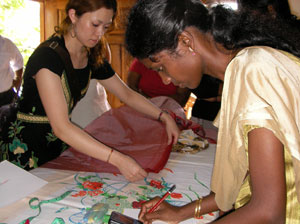
Rajini and Japanese trainer.
Rajini, 32, lives in a one room tin shack with her mother, younger sister and a mentally handicapped younger brother. Hailing from Jaffna, Sri Lanka`s northern peninsula that was the centre of the now ended thirty-year old ethnic war in the country, the young woman symbolizes both the suffering of innocent civilians during conflict as well as the other amazing side of destruction—enduring courage and determination to survive despite all odds. (more…)
105 Comments
A New Year for Gender Masala
Posted on January 2, 2010, by mercedes, under Gender Masala, culture, media, stereotypes, women, men and more.
This is truly a New Year in many ways: Gender Masala and I are in transition in 2010.
I am moving to Maputo, Mozambique, to work in health reporting. Gender Masala will remain in the IPS Gender Portal with a more collective identity, infused by several IPS writers.
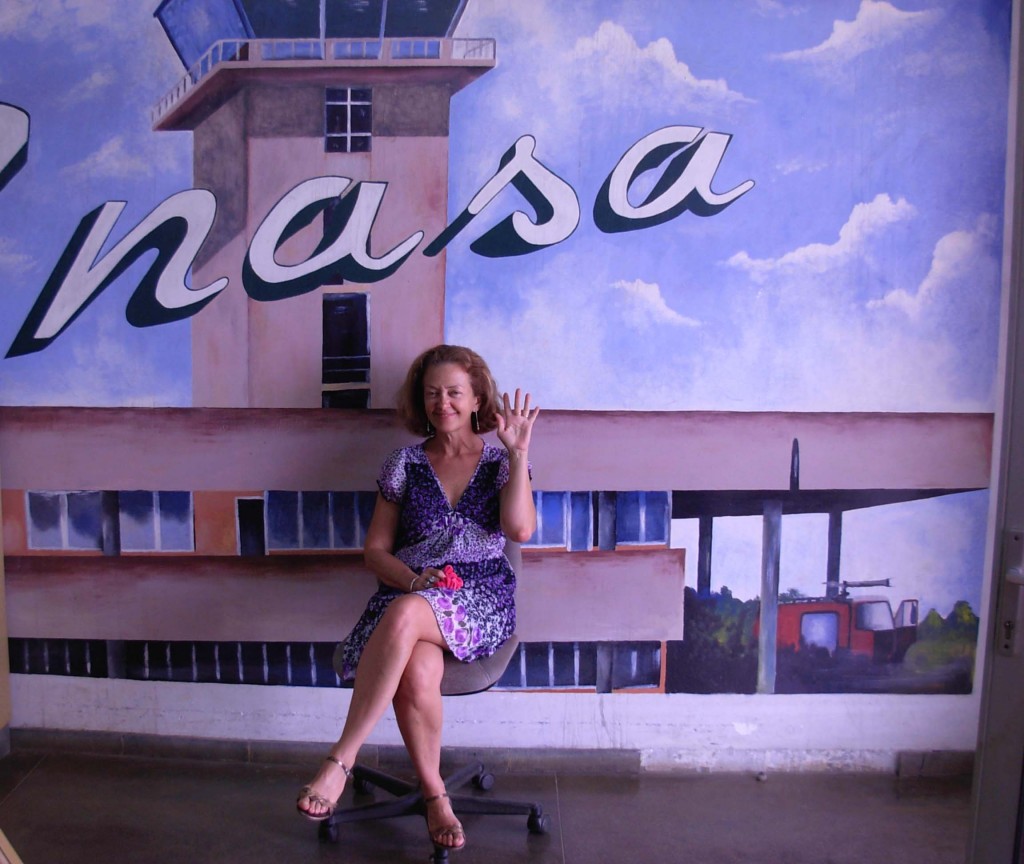
Passenger in transit: "The real voyage of discovery consists not in seeking new landscapes but in having new eyes." Marcel Proust. Pic by Claudio Corallo.
I like the word transitions: it evokes change, birth, adaptation, growth.
This has been an exciting journey of discovery of a new medium. As the philosopher George Santayana wrote: “There is wisdom in turning as often as possible from the familiar to the unfamiliar; it keeps the mind nimble; it kills prejudice, and it fosters humor.”
Over seven months, , the pictures got bigger, the voices varied, my style freer. It was intellectually rewarding to look every week at the rich variety of IPS stories on gender and be inspired by them to write a new blog.
I will miss the weekly postings on gender, although I will continue blogging on health issues in Mozambique here:
http://knight.icfj.org/OurFellows/FromtheFieldFellowBlogs/
I want to thank my fellow bloggers, you, the readers, and, most importantly, IPS, for this opportunity to add a spicy mix to the MDG3 Gender Portal. I enjoyed it immensely and I hope you did too.
Peace in 2010.
209 Comments
A Babel of Jargon
Posted on December 31, 2009, by mercedes, under Gender Masala, culture, media, stereotypes.

A collective indigestion of jargon. Photo by Beralpo, Wikimedia Commons
My friend is looking for a job. He finds an ad of the US-based Mercy Corps and calls me for a translation. The ad is in English - sort of - but he can’t figure out what it is about:
“Invitation for a consultancy in conducting a training on enhancing facilitation skills of development practitioners of livelihood enhancement programs.”
What does this text mean exactly, except that we have a collective indigestion of development jargon from NGOs and the UN, from academics and politicians, and that the media is complicit in this masquerading of long words as substance? (more…)
61 Comments
Out of darkness: facing breast cancer
Posted on December 28, 2009, by mercedes, under Gender Masala, culture, health, media, women, men and more.
Guest blogger: Paola Rolletta, IPS stringer in Mozambique.
I feel neither more “good” nor more “patient”. I am a hard-headed woman, as always. Attached to life, as ever!
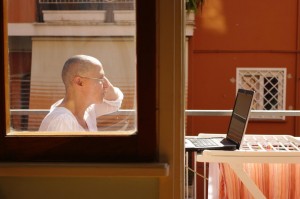
Paola Rolletta by Luis Abelard
The day when my friend Pigi, my oncologist, told me that I had breast cancer, I cried desperately. The first thing I did was to phone my partner to tell him this piece of news, of which I had had some premonition. And I understood that premonition really exists.
Curiously, I did not wonder “Why me?” My reaction was: “This cursed disease has hit me too!” (more…)
19 Comments
Fabrications around AIDS in 2010
Posted on December 26, 2009, by mercedes, under Gender Masala, HIV/AIDS, arts, culture, health, media.
By Mary Crewe and Pierre Brouard
Center for the Study of AIDS, University of Pretoria, South Africa
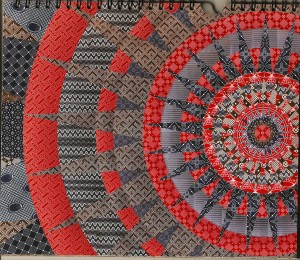 Fabrications is the theme of the 2010 calendar produced by the Center for the Study of AIDS. The gorgeous images are digitally manipulated African textiles.
Fabrications is the theme of the 2010 calendar produced by the Center for the Study of AIDS. The gorgeous images are digitally manipulated African textiles.
The notion of “fabrications” was inspired by the many stories of the AIDS quilts – designed to tell a story about someone who had died of AIDS, to honour them and to create a memorial to them that could be used as part of the fabric of people’s daily lives.
A fabrication is in this sense both a physical construction of fabrics, but also a psychological and social construction, the story of a life.
We need to tell people’s stories but we also need to acknowledge that we use stories to make sense of AIDS, to cope with it, to fashion it into something bearable, to give it meaning. (more…)

